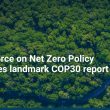Caixa has introduced a new protocol designed to strengthen Brazil’s response to extreme climate events, launching the initiative as COP30 unfolds in Belém, Pará. The measure seeks to reduce the impacts of climate-related disasters and improve the bank’s ability to respond swiftly to emergencies, while supporting wider efforts to build a coordinated national disaster prevention and response network.
The protocol outlines a series of emergency actions, including the release of government assistance, access to FGTS funds, and the temporary suspension of service fees, loan instalments, and financing obligations. It also sets out rapid-response mechanisms for situations involving threats to human life or widespread business disruption.
Once a risk alert is issued by the relevant authority, Caixa will circulate information across its network of branches and partner units, including lottery outlets and self-service points. Digital communication channels—such as the bank’s website, WhatsApp, Caixa Tem, the FGTS app, and the Housing app—will also be activated. Services may be adjusted locally to ensure continued access to social benefits, FGTS withdrawals, housing support, rural credit, microcredit, and working capital.
The protocol further allows services that normally require in-person attendance to be delivered through digital platforms. Where physical infrastructure is damaged, Caixa will deploy mobile teams using trucks or temporary stations set up in shelters and public spaces. Clients unable to present official documents may be allowed to use alternative forms of identification.
Caixa President Carlos Vieira described the protocol as a practical response to escalating climate risks. “It aims to strengthen the bank’s governance and enable the mobilisation of resources, agility, technological integration, information sharing, and cooperation, so that we may confront the unpredictability of events driven by climate change in the country,” he said.
Minister of Regional Development Waldez Góes welcomed the move, noting its alignment with the National Civil Protection and Defence Plan. “Public policy falls within the purview of the federal government, but prevention, mitigation, preparedness, response, and reconstruction occur across diverse territories and at all levels of government, in addition to private and social volunteer efforts. Initiatives such as this one will be replicated across many other federal agencies,” he said.
Nahuel Arenas, Regional Director for the Americas and the Caribbean at the United Nations Office for Disaster Risk Reduction (UNDRR), underscored the relevance of the initiative and the need to learn from recent disasters. “Brazilian institutions spared no effort to prevent the worst,” he said.
















